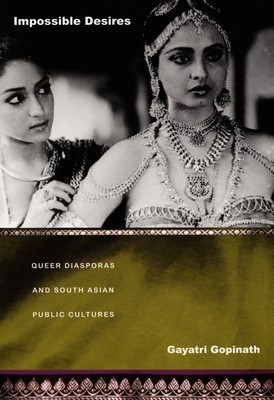
- We will send in 10–14 business days.
- Author: Gayatri Gopinath
- Publisher: Duke University Press
- ISBN-10: 0822335131
- ISBN-13: 9780822335139
- Format: 15.2 x 22.9 x 1.5 cm, softcover
- Language: English
- SAVE -10% with code: EXTRA
Reviews
Description
By bringing queer theory to bear on ideas of diaspora, Gayatri Gopinath produces both a more compelling queer theory and a more nuanced understanding of diaspora. Focusing on queer female diasporic subjectivity, Gopinath develops a theory of diaspora apart from the logic of blood, authenticity, and patrilineal descent that she argues invariably forms the core of conventional formulations. She examines South Asian diasporic literature, film, and music in order to suggest alternative ways of conceptualizing community and collectivity across disparate geographic locations. Her agile readings challenge nationalist ideologies by bringing to light that which has been rendered illegible or impossible within diaspora: the impure, inauthentic, and nonreproductive.
Gopinath juxtaposes diverse texts to indicate the range of oppositional practices, subjectivities, and visions of collectivity that fall outside not only mainstream narratives of diaspora, colonialism, and nationalism but also most projects of liberal feminism and gay and lesbian politics and theory. She considers British Asian music of the 1990s alongside alternative media and cultural practices. Among the fictional works she discusses are V. S. Naipaul's classic novel A House for Mr. Biswas, Ismat Chughtai's short story "The Quilt," Monica Ali's Brick Lane, Shyam Selvadurai's Funny Boy, and Shani Mootoo's Cereus Blooms at Night. Analyzing films including Deepa Mehta's controversial Fire and Mira Nair's Monsoon Wedding, she pays particular attention to how South Asian diasporic feminist filmmakers have reworked Bollywood's strategies of queer representation and to what is lost or gained in this process of translation. Gopinath's readings are dazzling, and her theoretical framework transformative and far-reaching.
EXTRA 10 % discount with code: EXTRA
The promotion ends in 17d.17:27:43
The discount code is valid when purchasing from 10 €. Discounts do not stack.
- Author: Gayatri Gopinath
- Publisher: Duke University Press
- ISBN-10: 0822335131
- ISBN-13: 9780822335139
- Format: 15.2 x 22.9 x 1.5 cm, softcover
- Language: English English
By bringing queer theory to bear on ideas of diaspora, Gayatri Gopinath produces both a more compelling queer theory and a more nuanced understanding of diaspora. Focusing on queer female diasporic subjectivity, Gopinath develops a theory of diaspora apart from the logic of blood, authenticity, and patrilineal descent that she argues invariably forms the core of conventional formulations. She examines South Asian diasporic literature, film, and music in order to suggest alternative ways of conceptualizing community and collectivity across disparate geographic locations. Her agile readings challenge nationalist ideologies by bringing to light that which has been rendered illegible or impossible within diaspora: the impure, inauthentic, and nonreproductive.
Gopinath juxtaposes diverse texts to indicate the range of oppositional practices, subjectivities, and visions of collectivity that fall outside not only mainstream narratives of diaspora, colonialism, and nationalism but also most projects of liberal feminism and gay and lesbian politics and theory. She considers British Asian music of the 1990s alongside alternative media and cultural practices. Among the fictional works she discusses are V. S. Naipaul's classic novel A House for Mr. Biswas, Ismat Chughtai's short story "The Quilt," Monica Ali's Brick Lane, Shyam Selvadurai's Funny Boy, and Shani Mootoo's Cereus Blooms at Night. Analyzing films including Deepa Mehta's controversial Fire and Mira Nair's Monsoon Wedding, she pays particular attention to how South Asian diasporic feminist filmmakers have reworked Bollywood's strategies of queer representation and to what is lost or gained in this process of translation. Gopinath's readings are dazzling, and her theoretical framework transformative and far-reaching.


Reviews